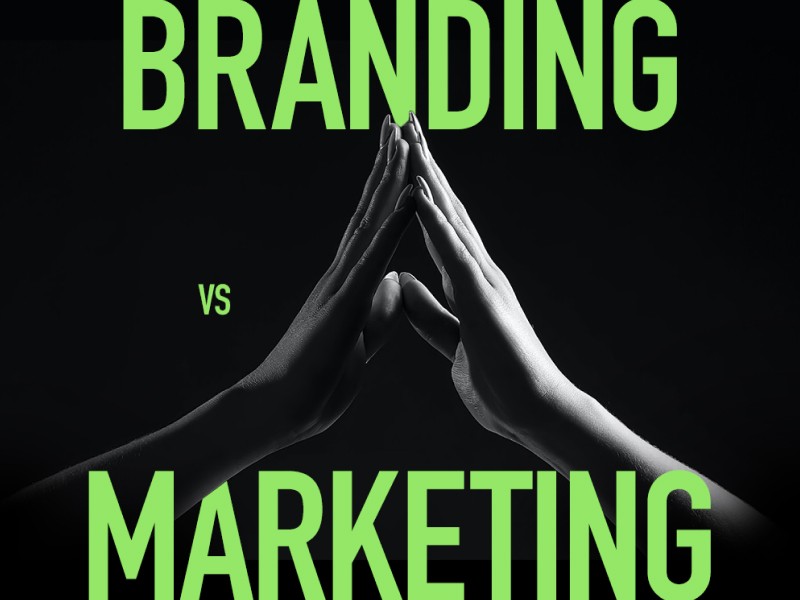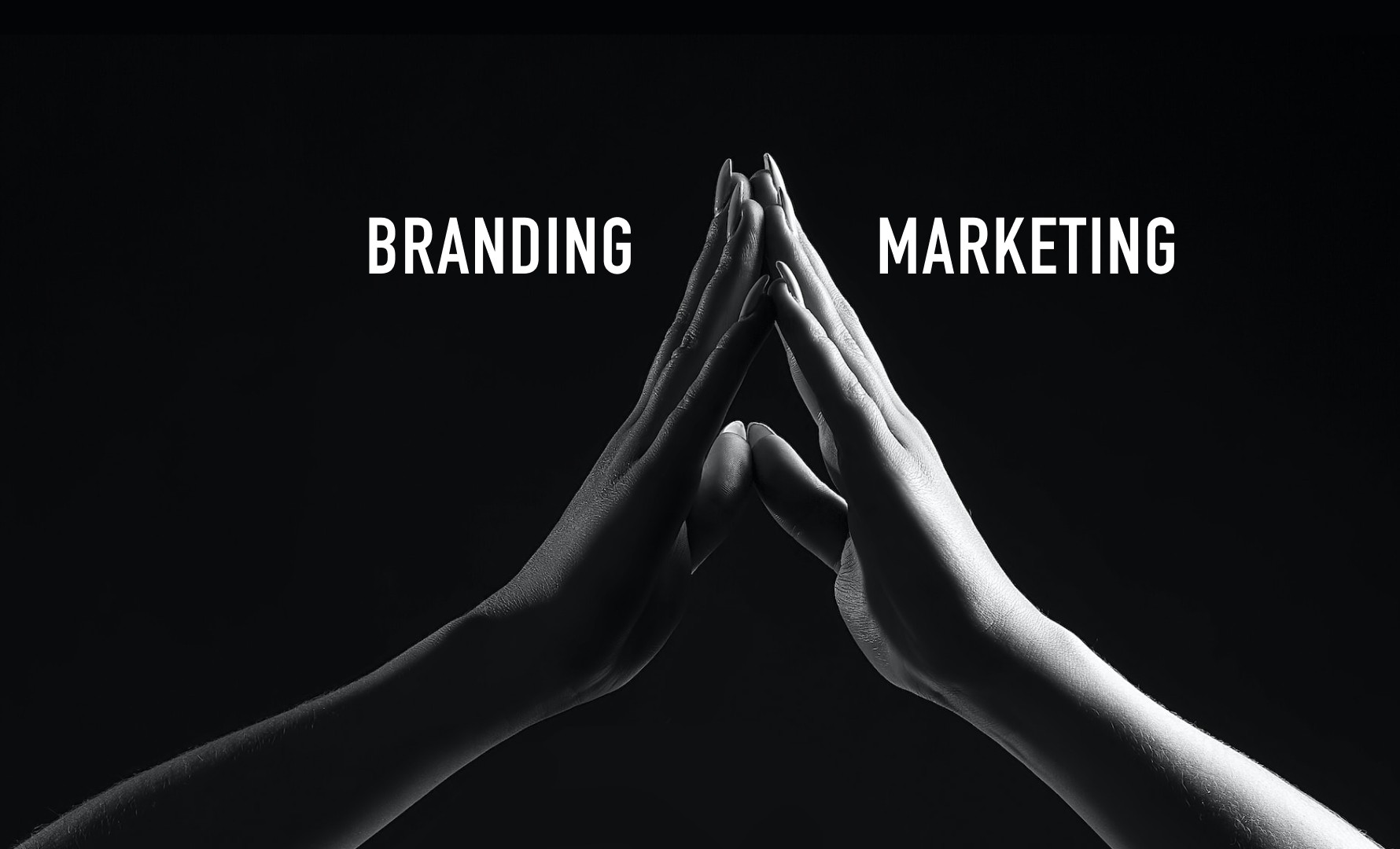Branding
Branding vs Marketing: How to Make Sense of the Differences and Boost Your Business
Discover the key differences between branding and marketing, and learn how to effectively use both strategies to grow your business.

Alex Stone
/
Aug 6, 2024


Branding and marketing are often used interchangeably, but they're actually quite different. While branding can help you sell your product or service, marketing is what you do to get people interested in buying it in the first place.
So how do you know if your business needs a brand? And how do you go about creating one? To answer these questions, let's take a look at some common misconceptions about branding.
Defining Branding
Branding is the process of creating a unique and consistent identity for your company or product. It's about more than just marketing; it's about defining who you are and what makes you different from everyone else.
The first step in branding is figuring out what makes your brand special--what are its mission, values, personality? Then comes visual elements like logos and colors that help convey those characteristics.
Next up: how does this all play out in the marketplace? How do customers perceive us (and why)?
Finally, once we've got all those pieces figured out we need to make sure they're working together seamlessly so people know exactly what they're getting when they see our logo or hear our name or experience one of our products/services.

Interconnected branding and marketing concepts
Defining Marketing
Marketing is the process of creating and delivering products and services that have value for customers. It involves communicating the value of those products and services, as well as developing relationships with customers.
Marketing can be thought of as having two main goals:
To create demand for your product or service (aka "marketing")
To deliver the product or service once someone has bought it (aka "sales")

The Relationship Between Branding and Marketing
You may be wondering, "What is the relationship between branding and marketing?"
The answer is simple: they're inseparable.
Marketing is how you promote your brand, while branding is how customers perceive your marketing efforts.
In order to create an effective brand-marketing relationship, it's important that both sides are aligned and working together toward the same goal--in this case, building a strong reputation for your company or product in the minds of consumers.

The Benefits of Understanding Branding and Marketing
Better customer engagement: Branding and marketing are two sides of the same coin. They both help you connect with your customers, but branding helps you do it in a more lasting way.
Stronger brand identity: When you're working on your brand, you're thinking about who you want to be as a company and how that fits into the world around us. This helps create a stronger connection between your company and its audience by giving them something they can relate to on an emotional level--and that makes them more likely to buy from or recommend your business.
Improved customer loyalty: People love brands because they know what they stand for (and therefore what kind of experience they'll have when interacting with them). When someone feels strongly enough about something, even if it's just an idea or feeling in their head instead of something tangible like an object or service offered by another company offering similar products/services at lower price.
How to Make Sense of Branding and Marketing
Whether you're a small business owner or a marketing manager at a large corporation, it's important to understand the difference between branding and marketing.
Brand: A brand is the promise you make to your customers about what they can expect from your product or service. Branding is about creating an emotional connection with your target audience by building trust in their minds through consistent messaging across all platforms--including social media channels, websites and print collateral like brochures or flyers.
Marketing: Marketing involves creating awareness for your product or service so that people know it exists (and hopefully want it). Marketing strategies include advertising campaigns on television or radio; public relations initiatives such as press releases; direct mail pieces; digital ads on search engines like Google AdWords; email newsletters sent out regularly with updates about new products/promotions/events etcetera.
The Role of Design in Branding and Marketing
A good design agency will be able to help you create a brand that is consistent and recognizable. They'll also help you develop an effective marketing strategy, which includes everything from social media posts to print materials and advertisements.
In order for this relationship between branding and marketing to work, it's important for both parties--the designer and the client--to understand each other's roles. The designer needs to know what kind of message they're trying to convey with their work; otherwise, they won't be able to come up with something that fits your needs perfectly.
On the other hand, if you don't have any input into how things look or feel (and aren't willing or able), then there may not be enough connection between what people see when looking at your brand identity versus what they experience when interacting with it in real life.

Tips for Making Your Brand and Marketing Stand Out
Develop a unique brand identity.
Use storytelling in your marketing.
Leverage the power of social media.
Focus on customer experience.
The Future of Branding and Marketing
The future of branding and marketing is all about personalization. With the rise of AI and machine learning, companies are able to deliver more targeted messages to their customers based on their preferences and behaviors.

The best way to stay ahead of the competition is by using these technologies in your own business practices--and that's not just limited to big brands like Amazon or Netflix. If you run an eCommerce store or blog, for example, you can use data from past purchases (or even website visits) to create relevant content recommendations for each customer who visits your site.
Conclusion
You now have a better understanding of the relationship between branding and marketing. The most important thing to keep in mind is that they are not one and the same, but they are closely related.
If you're still confused about how to make sense of it all, let me give you an example: If I were trying to sell my old car on Craigslist (which I am not), I would first take some time off from work and clean up my garage so that buyers could see what kind of condition my car was in when they came over for a test drive. Then I would spend some time researching other listings for similar cars online so that I could price mine competitively; otherwise no one would buy it!
Finally, once everything was ready--the garage cleaned up nicely with plenty of space available for potential buyers' cars as well as mine; pricing set at an attractive level; etc.--I'd post an ad listing all these details along with photos showing off its features (including interior shots).
FAQs
What is the difference between branding and marketing?
Branding is the process of creating a unique identity for your business or product, including the name, logo, and messaging that sets it apart from competitors. Marketing, on the other hand, is the process of promoting and selling your product or service through various channels, such as advertising, PR, and sales.
Which is more important: branding or marketing?
Both branding and marketing are important for business success, and they work together to achieve the same goal. Branding establishes your business's identity and personality, while marketing promotes your brand and drives sales. Without effective branding, your marketing efforts may fall flat, and without effective marketing, your brand may not reach its full potential.
Can branding and marketing be done by the same person or team?
Yes, branding and marketing can be done by the same person or team, but it's important to understand the differences between the two processes. Branding requires a strong understanding of the business's identity and target audience, while marketing requires knowledge of various channels and tactics to promote the brand effectively. It's important to have a balanced approach and ensure that both branding and marketing efforts are aligned with overall business goals.
Take your company to the next round.
Founders, CMOs, and business leaders have put their trust in us to help them create better and memorable brands.
Are you ready?
Bring your tech brand to life
If shaping a game-changing tech brand sounds like your ambition, don't wait.
Start the conversation
Free 30 min call, no obligation



TRUSTED BY
Australia's Top Marketers
Are you ready?
Bring your tech brand to life
If shaping a game-changing tech brand sounds like your ambition, don't wait.
Start the conversation
Free 30 min call, no obligation



TRUSTED BY
Australia's Top Marketers
Are you ready?
Bring your tech brand to life
If shaping a game-changing tech brand sounds like your ambition, don't wait.
Start the conversation
Free 30 min call, no obligation



TRUSTED BY
Australia's Top Marketers
Ready for a team with proven success? Bettermade delivers, every time.
Resources
Ready for a team with proven success? Bettermade delivers, every time.
Resources
Ready for a team with proven success? Bettermade delivers, every time.
